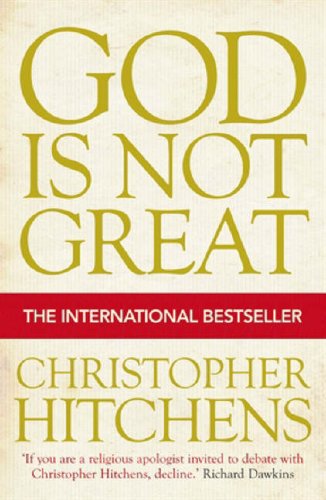
This is going to be my first review in English. Don't Panic! As I recently only read and watch both TV series and films in English (usually without subs) seems to me the perfect way to express ideas and concepts from the books, as well as a way to improve my skills. Please help me notice any inconvenience or mistake.
I've been constantly thinking about this post since I finished the book almost two months ago. In this time lapse Mr. Hitchens died, with the subsequent hard time for us his followers. Embarrassingly I didn't have the time and/or strength to write about it, I found it difficult to write something different than what many others wrote. Although it was not a surprise for anyone, his death truly made me very sad and angry.

God is not Great is a 2007 book from Christopher Hitchens. In this book he made a fierce and sincere apology against religion, or at least against organized religion. Focusing on the Abrahamic religions, the book contains a perfectly documented collection of facts, personal anecdotes and well chosen arguments. In each of the nineteen chapters the author explains (for example) how religion kills, how do we know some metaphysical claims of religion are false, the lies behind intelligent design, and how some religions have ended in the past.
In Chapter Two, Religion Kills, he described common irrationally violent situations in many cities (Belfast, Beirut, Bombay, Belgrade, Bethlehem or Baghdad) easily attributed to religion. He also wrote about the 1989 fatwa against his friend Salman Rushdie and the crazy actions driven by the US after the September 11 attacks, as examples where religious leaders pursued, allowed and justified big massacres.
In Chapter Four, A Note On Health, he reminds us of some big confrontations between medicine and religion: some vaccines, condoms, the Jewish circumcision and the female genital mutilation rituals, and the pursuing and punishment of homosexuality.
Chapter Five, The Metaphysical Claims of Religion Are False, where Mr. Hitchens explains the difference between the knowledge of the world today and when some religions where founded. He claims that the necessary leap of faith needs to be repeated, and it turns harder to take the more it is taken.
In Chapter Nine, The Koran Is Borrowed From Both Jewish and Christian Myths he examines the religion of Islam and its holy book, the Koran, asserting that it was not supernatural and simply was a compendium of other religious texts and sayings.
Chapter Thirteen, Does Religion Make People Behave Better?, explains how non-religious people stand and pursue moral causes with at least as much strength and clearness as religious people. He also notes many issues of misbehavior in religious leaders.
In Chapter Fourteen, There Is No 'Eastern' Solution, he blames Asiatic religions as Buddhism and Hinduism with similar sins and problems: the violence, the unverifiable assumptions, the unhealthy manners and rituals, etc.
Chapter Fifteen, Religion As An Original Sin, where he declares that there are several ways in which religion is not just amoral but positively immoral, being the faults found not in its adherents but in its original precepts. These include:
- Presenting a false picture of the world to the credulous
- The doctrine of blood sacrifice
- The doctrine of atonement
- The doctrine of eternal reward or eternal punishment
- The imposition of impossible tasks or rules
And Finally Chapter Nineteen, In Conclusion: The Need for a New Enlightenment, where he argues that the human race no longer needs religion, to the point that underestimating religion will improve mankind, and will boost the progress of civilization. He ends asking atheists to fight for a religion-free society.
Some of the commonly selected quotes are:
- Organized religion is violent, irrational, intolerant, allied to racism, tribalism, and bigotry, invested in ignorance and hostile to free inquiry, contemptuous of women and coercive toward children.
- Religion spoke its last intelligible or noble or inspiring words a long time ago.
- I can think of a handful of priests and bishops and rabbis and imams who have put humanity ahead of their own sect or creed. History gives us many other such examples, which I am going to discuss later on. But this is a compliment to humanism, not to religion.
- At least two major and established religions, with millions of adherents in Africa, believe that the cure is much worse than the disease. They also harbor the belief that the AIDS plague is in some sense a verdict from heaven upon sexual deviance--in particular upon homosexuality.
- In Ireland alone--once an unquestioning disciple of Holy Mother Church--it is not estimated that the unmolested children of religious schools were very probably the minority.
- One must state it plainly. Religion comes from the period of human prehistory where nobody--not even the mighty Democritus who concluded that all matter was made from atoms--had the smallest idea what was going on. It comes from the bawling and fearful infancy of our species, and is a babyish attempt to meet our inescapable demand for knowledge (as well as for comfort, reassurance, and other infantile needs). Today the least educated of my children knows much more about the natural order than any of the founders of religion and one would like to think--though the connection is not a fully demonstrable one--that this is why they seem so uninterested in sending fellow humans to hell.
- Conceivably, some readers of these pages will be shocked to learn of the existence of Hindu and Buddhist murderers and sadists. Perhaps they dimly imagine that contemplative easterners, devoted to vegetarian diets and meditative routines, are immune to such temptations?
- If religious instruction were not allowed until the child had attained the age of reason, we would be living in a quite different world.
- Philosophy begins where religion ends, just as by analogy chemistry begins where alchemy runs out, and astronomy takes the place of astrology.
- Religion has run out of justifications. Thanks to the telescope and the microscope, it no longer offers and explanation of anything important.
Mr. Hitchens was an English (also American since 2007) journalist, author and polemicist, in the wider meaning of the expression. He was considered one of the main intellectuals of the world, and was clearly identified as a Pope (in the techie way) in the atheist movement. After a brilliant career with a lot of polemic confrontations with people as Mother Teresa (Hell's Angel documentary) or Bill Clinton (No One Left to Lie To), and demolishing debates against figures like Tony Blair, he faced some serious health issues due to an oesophageal cancer. On 15 December 2011, Hitchens died from pneumonia, as a complication of this cancer.
I'm not used to write bios in this blog, but if that moment comes surely he is going to be among the firsts to appear.





